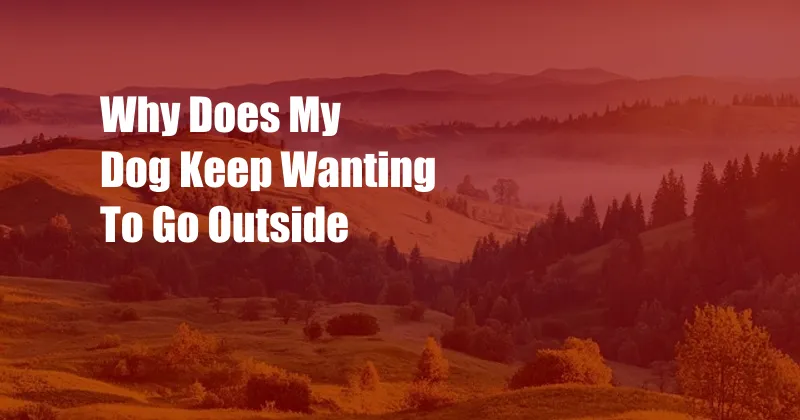
Why Does My Dog Keep Wanting to Go Outside?
My beloved golden retriever, Buddy, had always been content with his daily walks and short backyard playtime. But recently, he’s become obsessed with going outside, constantly pacing at the door and whining. I found myself perplexed and concerned. Understanding his behavior became my mission, and through research and observations, I’ve discovered the myriad reasons why dogs may incessantly seek the outdoors.
The answer to this question lies in understanding canine instincts, health conditions, and environmental factors. Dogs are natural explorers and scavengers, driven by an inherent desire to roam and investigate their surroundings. Sometimes, simply sniffing the air or chasing a scent can fulfill this instinct. However, certain health issues and environmental changes can also trigger excessive outdoor seeking.
Understanding Canine Instincts
Exploratory Instinct: Dogs possess a strong urge to explore and investigate their surroundings. Going outside satisfies this instinct, providing them with sensory stimulation and mental enrichment. They may enjoy exploring new scents, sights, and textures in their environment.
Scavenging Behavior: Dogs are descendants of scavengers and may retain the instinct to hunt and forage for food. Going outside may provide them with the opportunity to search for potential food sources, such as small animals or discarded food scraps.
Health Conditions
Urinary Tract Infection (UTI): Dogs with UTIs may experience frequent urination, which can lead them to seek relief by going outside. Symptoms of a UTI include straining to urinate, bloody or cloudy urine, and increased thirst.
Gastrointestinal Issues: Digestive problems, such as diarrhea or constipation, can also cause dogs to want to go outside more frequently. They may seek relief from discomfort or an urgent need to defecate.
Environmental Factors
Boredom: Lack of mental and physical stimulation can lead to boredom, which can manifest as excessive outdoor seeking. Providing your dog with regular exercise, playtime, and interactive toys can help alleviate boredom.
Anxiety: Some dogs may experience anxiety when left alone for extended periods. Going outside may provide them with a sense of comfort and security and help reduce their stress levels.
Tips and Expert Advice
Establish a Regular Routine: Consistent toilet breaks and exercise times help your dog regulate their bodily functions and reduce the likelihood of accidents or excessive outdoor seeking.
Provide Mental Stimulation: Engage your dog in activities that stimulate their brain and prevent boredom, such as playtime, training sessions, and interactive toys like puzzle feeders.
Rule Out Health Conditions: If your dog suddenly starts seeking the outdoors excessively, schedule an appointment with your veterinarian to rule out any underlying health issues.
Address Anxiety: If your dog experiences anxiety when left alone, consider crate training, providing calming aids like pheromone diffusers, or consulting with a veterinary behaviorist.
Frequently Asked Questions
Q: Why does my dog pace at the door and whine?
A: Pacing and whining at the door can indicate a need to eliminate, boredom, or anxiety. Address these underlying reasons accordingly.
Q: How much outdoor time does my dog need?
A: The amount of outdoor time a dog needs varies depending on factors like breed, age, and activity level. Generally, aim for at least 30 minutes of exercise and playtime per day.
Q: Can excessive outdoor seeking be a sign of separation anxiety?
A: Yes, excessive outdoor seeking can be a symptom of separation anxiety. Other signs include destructive behavior, pacing, and excessive panting when you’re away.
Conclusion
Understanding why your dog keeps wanting to go outside is crucial for their well-being. By exploring canine instincts, health conditions, and environmental factors, you can identify the underlying cause and address it accordingly. Remember, if you observe any sudden changes in your dog’s behavior, consult with your veterinarian for professional advice.
Are you interested in learning more about canine behavior and training? Let me know, and I’ll be happy to share my insights and expertise with you!